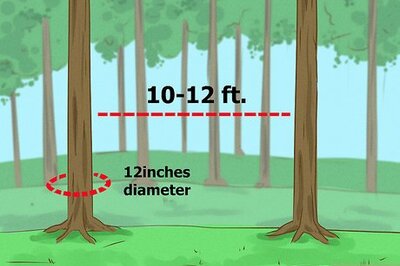
views
Significance of 9 in the Bible
The number 9 means judgement, completion, or fruits. The number 9 frequently occurs in association with judgments on God’s people, like the Day of Atonement, the fall of Jerusalem, and the destruction of Jerusalem’s two temples. It can also signal the completion of something, like the end of a 9-year cycle in Leviticus or God’s authority. In the New Testament, the number 9 is often associated with spiritual gifts, like the fruits of the spirit, the vision given to the Roman Cornelius, or the 9 sign gifts given to followers.
Judgment
The Day of Atonement begins on the 9th day of the 7th month. The Day of Atonement spans from evening to evening, so the majority of this holy day is celebrated on the 10th day of the 7th month in the Hebrew calendar (Tishri). But the observance begins on the 9th day at sundown. On the Day of Atonement, priests used holy rituals and sacrifices to atone for the sins of the Israelites. Leviticus 23:32 says: “From the evening of the ninth day of the month until the following evening you are to observe your sabbath.” The Day of Atonement, or Yom Kippur, is still observed by Jewish people today.
The last king of Israel, Hoshea, ruled for 9 years. 2 Kings chapter 17 describes King Hoshea’s failed rebellion against the Assyrians. King Hoshea was captured and imprisoned, and after a 3-year siege of the capital, the Israelites were scattered throughout Assyria. 2 Kings 17:7–8 makes it clear that this defeat was a judgment from God: “All this took place because the Israelites had sinned against the Lord their God, who had brought them up out of Egypt from under the power of Pharaoh king of Egypt. They worshiped other gods and followed the practices of nations the Lord had driven out before them.”
Jesus healed 10 lepers but only 1 returned to thank him. In Luke chapter 17, Jesus was traveling with his followers when they met 10 lepers. They called out to Jesus, who healed them. But only one of the healed men came back to praise Jesus and thank him for the life-changing miracle, and Jesus criticized the others. Leviticus 17:17–19 says, “Jesus asked, ‘Were not all ten cleansed? Where are the other nine? Has no one returned to give praise to God except this foreigner?’ Then he said to him, ‘Rise and go; your faith has made you well.’”
Jesus died on the 9th hour of the day. Matthew chapter 27 says that as Jesus was being crucified, darkness covered the land for 3 hours—from the 6th hour to the 9th hour (about noon to 3 p.m.). Then, Jesus cried out twice and died. Most versions say that Jesus died at around 3 in the afternoon. But in early translations like the King James Version, Matthew 27:46 says, “And about the ninth hour Jesus cried out with a loud voice, saying, “Eli, Eli, lama sabachthani?” that is to say, “My God, My God, why hast Thou forsaken Me?” Jesus’ death is the ultimate symbol of God’s judgment—His own son had to die to cover the sins of mankind.
Completion or Finality
9 represents God’s ultimate authority. 9 is the product of 3x3, and throughout the Bible, 3 is the number of God. This indicates that 9 is a symbol of God’s ultimate authority. It can also represent the threefold power of the Trinity—God is 3-in-one and the number 3 at the same time.
Leviticus describes a nine-year cycle for farmers. In Leviticus chapter 27, God commands that once they’re in the Promised Land, the Israelites should sow their lands for 6 years but leave their fields untended and unharvested in the 7th year. But He promises that in the 6th year, He will send a bountiful crop that will last through the 9th year. This is described in Leviticus 27:21–22: “I will send you such a blessing in the sixth year that the land will yield enough for three years. While you plant during the eighth year, you will eat from the old crop and will continue to eat from it until the harvest of the ninth year comes in.”
There were 9 generations from Adam to Noah and Noah to Abraham. Noah was a 9th-generation descendant of Adam, marking a complete era from the creation of man through the widespread destruction of the flood. And there were 9 generations between Noah and Abraham—a complete era after the rebirth of man, leading up to the birth of God’s chosen people. The generations from Adam to Noah were Adam, Seth, Enosh, Kenan, Mahalalel, Jared, Enoch, Methuselah, Lamech, and Noah. (1 Chronicles 1:1) The generations from Noah to Abraham were Noah, Shem, Arphaxad, Shelah, Eber, Peleg, Reu, Serug, Nahor, Terah, and Abram (Abraham). (1 Chronicles 1:24–27)
Fruitfulness and Spiritual Traits
God created humans with a 9-month gestation period. Based on the symbolism of the number 9, that 9-month period can be interpreted to be a complete term that results in a beautiful fruit. In fact, the Bible often refers to offspring as the “fruit of the womb.” Deuteronomy 7:13 says, “He will love you and bless you and increase your numbers. He will bless the fruit of your womb.”
The fruit of the Spirit has 9 attributes. The book of Galatians is a letter written by Paul to early Christians in Galatia. In chapter 5, Paul exhorts the Galatians to avoid temptations of the flesh, like hatred or impurity. Instead, he encourages them to embody the gifts given by the Holy Spirit. Galatians 5:22–23 says, “But the fruit of the Spirit is love, joy, peace, forbearance, kindness, goodness, faithfulness, gentleness, and self-control. Against such things there is no law.”
The Roman Cornelius had a vision in the 9th hour of the day. Acts chapter 10 describes a devout Roman centurion named Cornelius who lived in Caesarea. At the ninth hour of the day (around 3 in the afternoon), he had a vision of an angel, who told him to contact Simon Peter and bring him to Caesarea. While Peter was visiting, he preached about the ministry of Jesus, and Cornelius and others were baptized. This is significant because it is the first recorded case of a Gentile being converted to Christianity. Acts 10:45 says, “The circumcised believers who had come with Peter were astonished that the gift of the Holy Spirit had been poured out even on Gentiles. For they heard them speaking in other languages and praising God.”
Early Christians were given 9 gifts by the Holy Spirit. 1 Corinthians is a letter from Paul to the church in Corinth. In chapter 12, Paul describes spiritual gifts that the Holy Spirit gave to Christians in the early church. These gifts were messages of wisdom, messages of knowledge, faith, healing, miraculous powers, distinguishing between spirits, speaking in tongues, and the interpretation of tongues. 1 Corinthians 12:11 says, “All these are the work of one and the same Spirit, and he distributes them to each one, just as he determines.”
Peter healed a lame man in the 9th hour of the day. Acts chapter 3 says, “One day, Peter and John were going up to the temple at the time of prayer—at three in the afternoon.” (Older translations say “being the ninth hour.”) They met a man who couldn’t walk and spent every day begging, but instead of giving him money, Peter healed him in Jesus’ name. Acts 3:7 says, “Taking him by the right hand, [Peter] helped [the man] up, and instantly the man’s feet and ankles became strong. He jumped to his feet and began to walk. Then he went with them into the temple courts, walking and jumping, and praising God.”
What does the number 9 mean in Hebrew?
The ninth letter in Hebrew is “tet.” It’s typically associated with the Hebrew word “tov,” which means “good.” However, can also indicate duality—like when God separates light from darkness during the Creation.



















Comments
0 comment